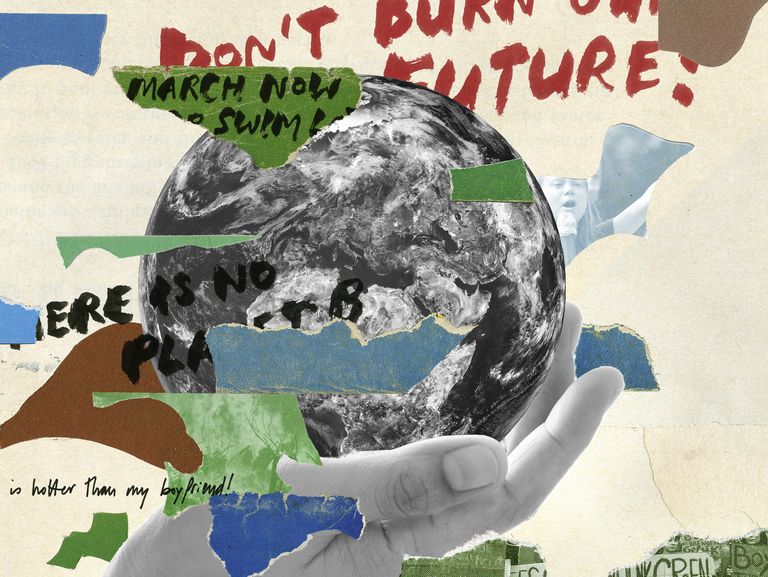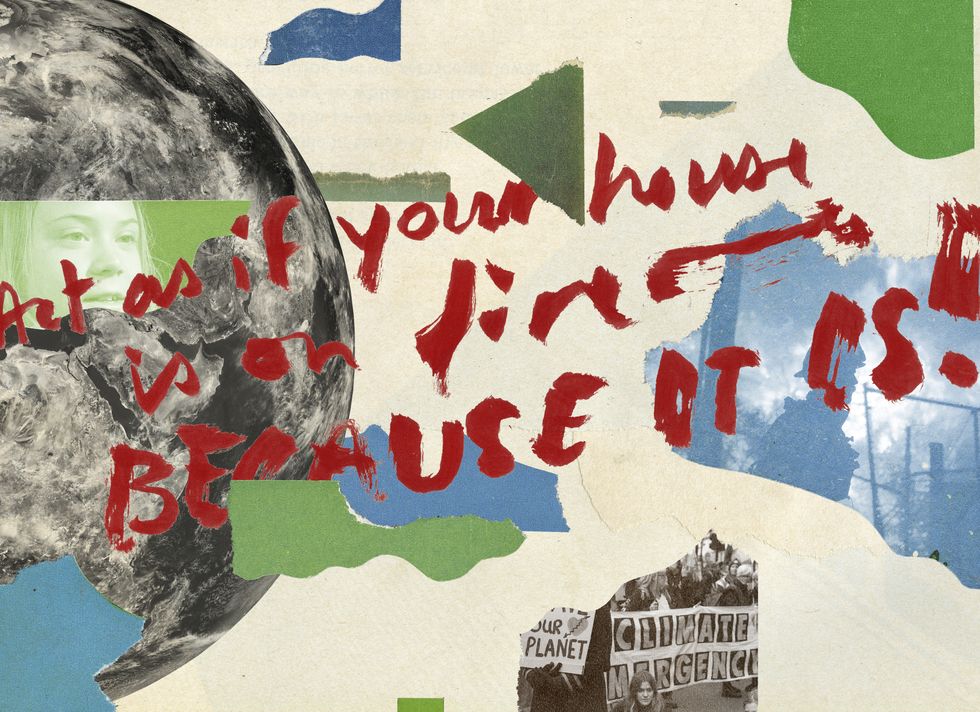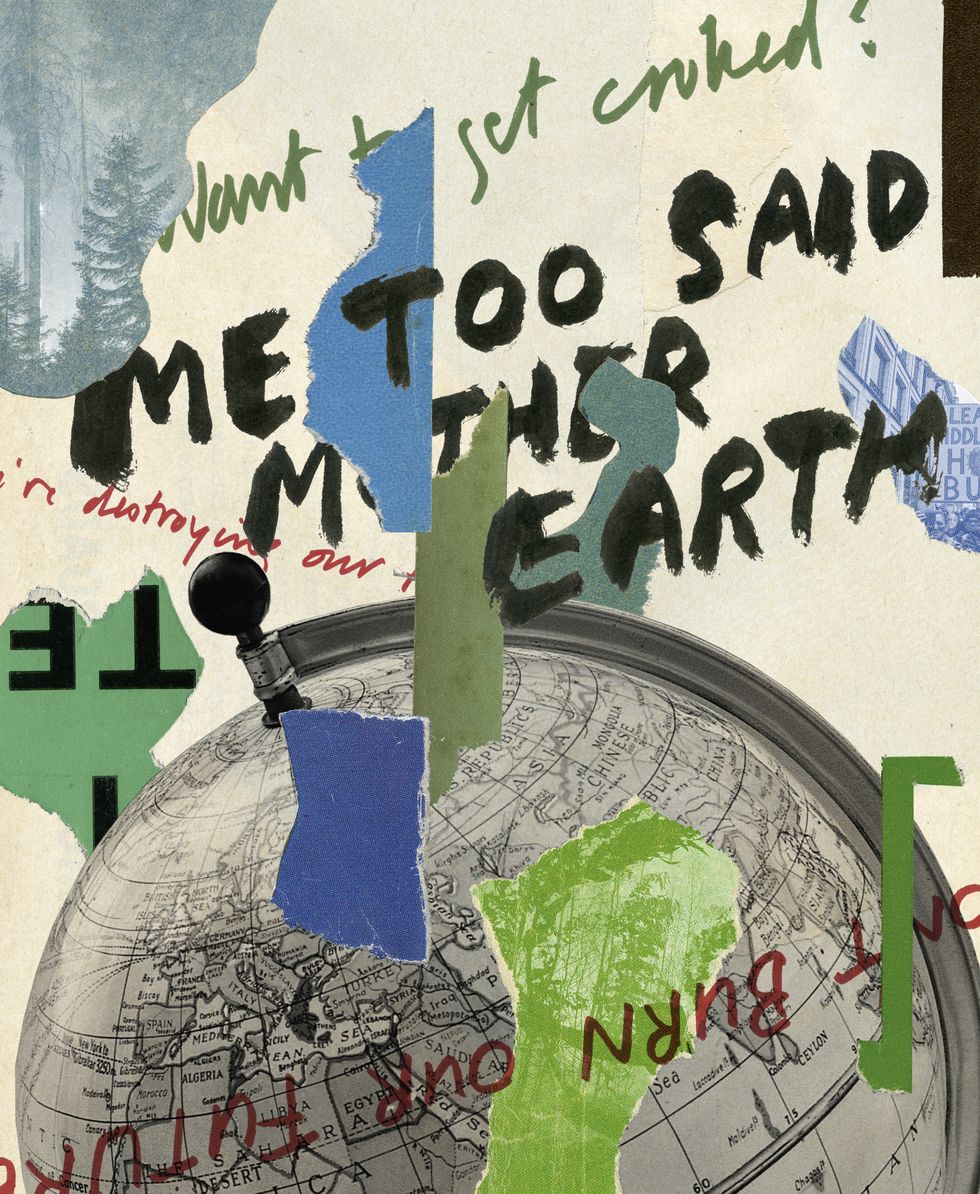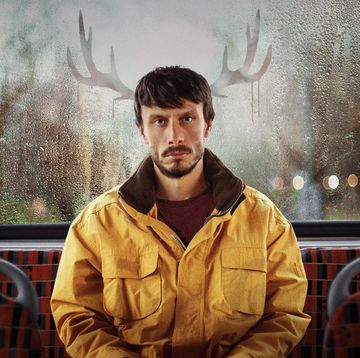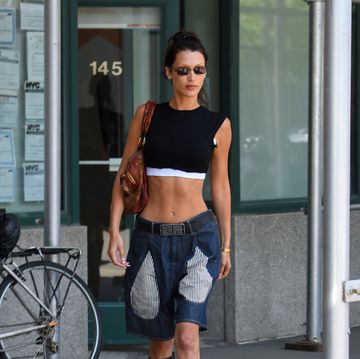While everyone else at the luxury resort in Mexico was lying on the postcard-worthy beach, Chelsea, 37, was scouring it. She spent her days looking for the plastic rings which hold beer cans together, picking them off the sand and putting them in the bin, and spent her nights worrying about how many others were still out there. 'My anxiety is greatly exacerbated by anything that isn’t "eco-conscious",' she says. ‘If I see a bunch of plastic water bottles in a bin, my anxiety spikes. A mattress in a dumpster, I’m thinking about it.'
For Chelsea, an actor living in Canada, small decisions are paralysing. She researches every product she purchases, weighing up its environmental impact. All she can hear in conversations with friends is them talking, absentmindedly, about decisions that are destroying the environment. It makes her stomach churn. ‘I am constantly trying to find a balance between respecting the earth and contributing to making it a better place, but also finding happiness in my own life,’ she says. ‘And because of my anxiety, it’s impossible.’
She has suffered from anxiety for as long as she can remember, but over the last few years it has become focused on the environment. It is pretty much the only thing she discusses with her therapist. ‘The worst part is that the vast majority of people do not understand,’ she continues. ‘They just shrug their shoulders and tell me, “It’s just some plastic bottles.” I can’t get them to understand that when I see those things, I go to the bigger picture right away. They often think I’m just torturing myself, that there’s nothing to be done, which in and of itself is upsetting.’
Molly Wingate, 23, who works in environmental policy, would love to be a mother, ‘But the idea of imposing this world on a child terrifies me,’ she says. ‘Not having children seems like the most reasonable decision but would also be an extremely radical choice for me to make personally.’ She likes to think of herself as a pragmatist, but she has done the research and knows the facts and her reaction feels justified. ‘Even the smallest actions, like buying plastic-free products, seem marred by hypocrisy,’ she says, ‘when I realise that the ingredients composing these products come from the other side of the globe. Or the almond milk I bought is decimating bee populations in California'. For the last couple of years she has felt ‘completely helpless’. Our socio-economic systems, she says, are destroying the planet. ‘I’ve come to think that dismantling, or even meaningfully reforming, these systems is an impossible task.’
Molly and Chelsea both experience acute climate anxiety. They are terrified about the future of the planet, and everyone else’s perceived inaction to save it. And while some might argue that the environment has become an easy repository for more general existential malaise that has affected young people for centuries – the climate is just this generation’s ‘thing’ to feel doomy about; the next punk, the next emo-culture – it is different to other forms of anxiety. Defined by the American Psychological Association as ‘a chronic fear of environmental doom’, it is when the state of the environment directly affects our mental health. And unlike other anxieties, it cannot be reasoned away because the threat is real, and more talked about, than ever.
The Lancet published a survey of 10,000 people aged 16 to 25 across 10 countries about their views on climate change. Over half felt sad, anxious, angry, powerless, helpless and guilty and 77% said the future was frightening. Over 45% said their feelings about climate change negatively affected their daily life and functioning. ‘Feeling fearful about climate change is rational and important,’ says Dr Elizabeth Marks, one of the authors of the study. ‘It is a natural and healthy response to a painful reality’ – humans are programmed to panic when they face an existential threat – ‘but it can be made even worse if people’s concerns are ignored or invalidated by others. This is not something to be “cured”; rather we must understand and honour it.’
The lack of control that many people feel around the state of the planet and its changing climate is an important factor. Control is key to survival, so humans feel anxiety in situations where we don’t feel like we have any. We see this throughout life: whether it’s getting on an airplane, going into another lockdown or feeling like governments aren’t doing enough to help. ‘Anxiety is a natural reaction to low feelings of personal and collective control over environmental problems,’ says Dr Cameron Brick, professor of social psychology at the University of Amsterdam, who specialises in the environment and sustainability.
Young people have even less control over their own lives and little influence over political decisions. ‘This can heighten the feelings of anxiety even more,’ says Dr Elizabeth Marks. ‘These young people believe that governments are lying about the impacts of their actions and failing, betraying and dismissing young people and future generations and, unsurprisingly, they also feel anguished, abandoned and belittled by governments,’ she says.
The source of our worry is not only the state of the planet, but the lack of response to it all. Telling us that our eco-anxiety is ridiculous, or overexaggerated, only makes the problem worse. It is doing the very thing that is causing it: denying that we have anything to worry about. ‘Climate anxiety can become very intense and challenging and represent a significant, chronic stressor for many people,’ continues Dr Marks. ‘This can be really difficult [in particular] for children and young people who face multiple stressors in their lives, but don’t possess the agency to change them.’ We must acknowledge and accept the anxiety in the first place, before finding ways to move forward from it.
But it’s also not just the scourge of young people. We are all engaging on a massive and meaningful scale with the realities of climate change – Extinction Rebellion marches are mainstream, extreme weather conditions fill the news, and activist Greta Thunberg is one of the most famous people in a generation. But the more we understand, the more anxious we become. This is particularly true for scientists exposed to this information all day. Many are plagued by a feeling of ‘scarcity’: that there is not enough time, enough resources or enough motivation to save the planet.
Megan Kennedy-Woodard and her partner, Dr Patrick Kennedy-Williams, were working as clinical psychologists in Oxford when, four years ago, they started to see a huge increase in climate researchers and academics affected by eco-anxiety. ‘We were bowled over by how quickly the [problem] arrived and how rapidly we had to respond,’ she says, ‘particularly as there was no standard practice.’ As a result, Kennedy-Woodard set up Climate Psychologists to help those suffering – and they have never been busier. ‘Initially, what we thought would be support for quite a niche group has profoundly expanded – from bankers to teachers, parents to filmmakers, the need is real.’
For all of us, the endless information online can easily cause our eco-anxiety to spiral out of control. ‘Time is running out,’ reads a TikTok video of raging wildfires set to dance music. The eco-content is never-ending. I scroll past a vast muddy canyon which used to be a glacier, maps of encroaching sea levels, a polar bear in an oil spill, a kangaroo in forest fire, a stork in a plastic bag, Donald Trump, hurricanes in New York, and a gentle reminder from a teenager standing in her garden to appreciate the world ‘while it is still here’.
The online climate conversation is so doom-orientated that it is at risk of becoming a meme, says Abbie Richards, 25, the founder of @Eco_Tok on TikTok. With over 119k followers on the platform, this account represents a group of climate researchers who share constructive, truthful videos. ‘What does well [on social media] is doom and gloom, terrifying content, apocalypse narratives,’ says Richards. ‘We see a lot of young people on TikTok who seem to be under this collective impression that the world is ending and there’s nothing they can do about it. This is why we need trained climate communicators who know how to take the scary information and tell it responsibly.’
This amping-up of anxiety is also reflected in activism. In August last year, a group of six German activists, ‘The Last Generation’, went on hunger strike for almost a month, demanding a meeting with politicians on global warming. Simon Helmstedt, 22, said that his starvation ‘is nothing compared to what we can expect when the climate crisis unleashes a famine here in Europe in 20 years’. This claim is not supported by the science. Climate change will affect agriculture in some regions of the world, which is of huge concern, but there is little evidence suggesting a European famine in two decades’ time.
Mainstream news headlines are flashy and frightening, and the frequency with which sites publish articles is overwhelming. Defeatist, alarmist messaging, says climate journalist Emily Atkin, often comes from amateurs: ‘I’m tired of having to spend hours debunking messy and blockbuster climate reporting from dudes who seemingly woke up a few mornings beforehand and decided they were climate journalists.’
‘Climate change is a very difficult subject to cover,’ she adds, ‘due in large part to the sophisticated 40-year disinformation campaign around the subject, perpetuated and funded by the multi-trillion dollar fossil fuel industry and its powerful political allies. But that doesn’t change the fact that harmful inaccuracies have been consumed by many people. The wheel comes full circle when climate journalists have to spend massive amounts of time and intellectual energy consuming and debunking the First Time Climate Bros’ stories.’
And scare stories end up having the opposite to their desired effect. Climate anxiety can be a useful way of bringing about meaningful change and motivating us to act, but too much can have the opposite effect. The more anxious we feel, the more overwhelming the task ahead of us looks, the less hope we have for the future, and the more likely we are to give up trying. The problem feels so big that we don’t know where to begin. But what we need to address the very real problems in front of us is motivation to try, optimism that we can make a difference and, ultimately, hope.
If you look at the world around us, things are changing, even if slowly. Choosing climate-friendly options makes economic, as well as ethical, sense now. Last year, we bought 43% more electric cars than the year before. General Motors says it will make only electric vehicles by 2035 and Ford says all vehicles sold in Europe will be electric by 2030. Despite the TikToks of factory chimneys belting out smoke, coal accounted for 1.8% of the UK’s electricity mix in 2020, compared with 40% almost a decade ago. The government recently announced that Great Britain will not use coal to generate electricity from October 2024. We must acknowledge the positive changes we have made in our behaviour. We are allowed to be proud of our eco-friendly decisions so far, without losing our determination to carry on.
The key, then, is to balance hope and worry. We must aim for ‘constructive doubt’ – an understanding of the reality of the threat – rather than ‘fatalistic doubt’ – that it’s too late for humanity to address the problem – and for ‘constructive hope’ – believing that collective awareness is rising – rather than ‘false hope’ – the assumption that everything will be fine. ‘False hope and fatalistic doubt may lead to avoidance, distancing and inaction,’ concluded a recent study published in Frontiers in Communication. ‘[But] having hope that humans will reduce climate change, along with recognition that we are not doing enough, may also motivate political action.’
What we all have the power to do right now is control our reaction, rather than the situation. ‘It may sound cliché,’ says Kennedy-Woodard, ‘but we find ourselves referring back to the serenity prayer in therapy and coaching: “Grant me the serenity to accept the things I cannot change, the courage to change the things I can, and wisdom to know the difference.” Remember that while there are things we certainly cannot change in the world, there is a crucial difference between feeling out of control and actually being without agency. If you are feeling powerless, disconnect from the news, focus on your immediate environment, make a list of the things you do have control over, at this present moment. Then try and commit to taking some small, achievable steps towards action.’
In a therapy setting, eco-anxiety is not treated like a typical condition, continues Kennedy-Woodard. ‘If someone came to us with a fear of spiders or a health anxiety or claustrophobia, you do a bit of thought challenging,’ she adds. ‘Are you actually in danger? Generally not. But with climate anxiety: yes, we’re in danger, we need to do something. The problem is going to carry on beyond your six therapy sessions.’
So what can we do, day-to-day, to help our climate anxiety? We all need to dispel the ‘myth of perfectionism’, she says, particularly when it comes to weighing up which consumer decision is more eco-friendly than another. ‘While we can all do our best individually, the root of this is a fundamentally flawed capitalist system. Letting go of your guilt and paralysis is very important.’ Prioritise self-care: take social media breaks, counteract every negative news story with three positive ones, talk about your eco-anxiety with other people and, more than anything, get outside and away from your screens. The thing that is central to your eco-anxiety – nature – can also become the cure to it.’
Clear goals and objectives are also essential. ‘Pessimism can be immobilising,’ says Joycelyn Longdon, an activist and academic specialising in climate science and social justice. Anxiety means that humans are, at last, understanding the reality of the situation, but the alternative should not be existential panic and paralysis.
‘When we know that we are part of the solution, rather than the problem, no matter how small we think our contribution is, the better we feel and the more change we inspire in others around us,’ she continues. ‘I feel empowered and hopeful despite the doom and gloom because the doom and gloom is not all that exists. Doom and beauty exist in parallel.’
As humans, our brains are wired to experience the extremes of anxiety: the world we live in is changing for the worse, therefore we must panic. But this natural, instinctive reaction to a real threat has been hacked – and heightened.
In order to sustain ourselves, and our action, we are going to need faith that the future will be better. We are going to have to find the emotional resilience to live with climate anxiety; to validate people’s feelings of fear while not making them spiral into panic; to differentiate between useful, motivating anger and paralysing doom-mongering. Being proud of the changes we have made up until this point does not mean that we will become self-satisfied and lazy. Hope, pride, concern and action can exist all at once. So don’t panic, it’s not the end of the world.
